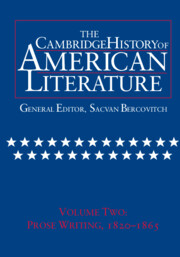Book contents
- Frontmatter
- Introduction
- CONDITIONS OF LITERARY VOCATION
- THE LITERATURE OF EXPANSION AND RACE
- THE TRANSCENDENTALISTS
- 1 Unitarian Beginnings
- 2 The Assault on Locke
- 3 Carlyle and the Beginnings of American Transcendentalism
- 4 “Annus Mirabilis”
- 5 The Establishment and the Movement
- 6 Letters and Social Aims
- 7 The Hope of Reform
- 8 Diaspora
- 9 The Antislavery Years
- NARRATIVE FORMS
- Chronology
- Bibliography
- Index
6 - Letters and Social Aims
from THE TRANSCENDENTALISTS
Published online by Cambridge University Press: 28 March 2008
- Frontmatter
- Introduction
- CONDITIONS OF LITERARY VOCATION
- THE LITERATURE OF EXPANSION AND RACE
- THE TRANSCENDENTALISTS
- 1 Unitarian Beginnings
- 2 The Assault on Locke
- 3 Carlyle and the Beginnings of American Transcendentalism
- 4 “Annus Mirabilis”
- 5 The Establishment and the Movement
- 6 Letters and Social Aims
- 7 The Hope of Reform
- 8 Diaspora
- 9 The Antislavery Years
- NARRATIVE FORMS
- Chronology
- Bibliography
- Index
Summary
Transcendentalism was from the beginning a literary movement as well as a religious and philosophical one. The Transcendentalists kept journals and wrote poetry; they wrote long letters about literature to one another; they tried their hand at prose sketches and Oriental fables; they delivered lyceum lectures and commencement speeches; they held “conversations” on topics like Beauty and Mythology; they reviewed books for the Christian Examiner and the North American Review. But few of the Transcendentalist texts that managed to find their way into print before the 1840s could be classified strictly as belles lettres. Perhaps only Emerson's Nature could really qualify as polite literature, a “prose poem” – though its review by Francis Bowen in the Christian Examiner in 1837 suggests that even Nature in its home territory was read more as a part of the philosophical skirmishing going on between the Lockeans and the spiritualists than as a work of the imagination.
There were many reasons for this state of affairs. The strong New England prejudice against fiction made writing novels or short stories out of the question for most of the Trancendentalists, even supposing that they had any talent for plot or dialogue or any interest in the social complexities novelists thrive on. Emerson ridiculed Jane Austen for her “vulgar boardinghouse imagination,” and Thoreau devoted a good part of the chapter “Reading” in Walden to abusing those readers who read with saucer eyes and digest with unwearied gizzards the latest romance about the Middle Ages. Poetry was considered more respectable, but the kind of Wordsworthian Romanticism practiced by William Cullen Bryant and the senior Richard Henry Dana seemed too derivative to appeal to the fiercely independent Transcendentalists, and the vogue for Byronic imitations that had marked the 1820s in America had died away without leaving much in its wake.
- Type
- Chapter
- Information
- The Cambridge History of American Literature , pp. 424 - 458Publisher: Cambridge University PressPrint publication year: 1995

